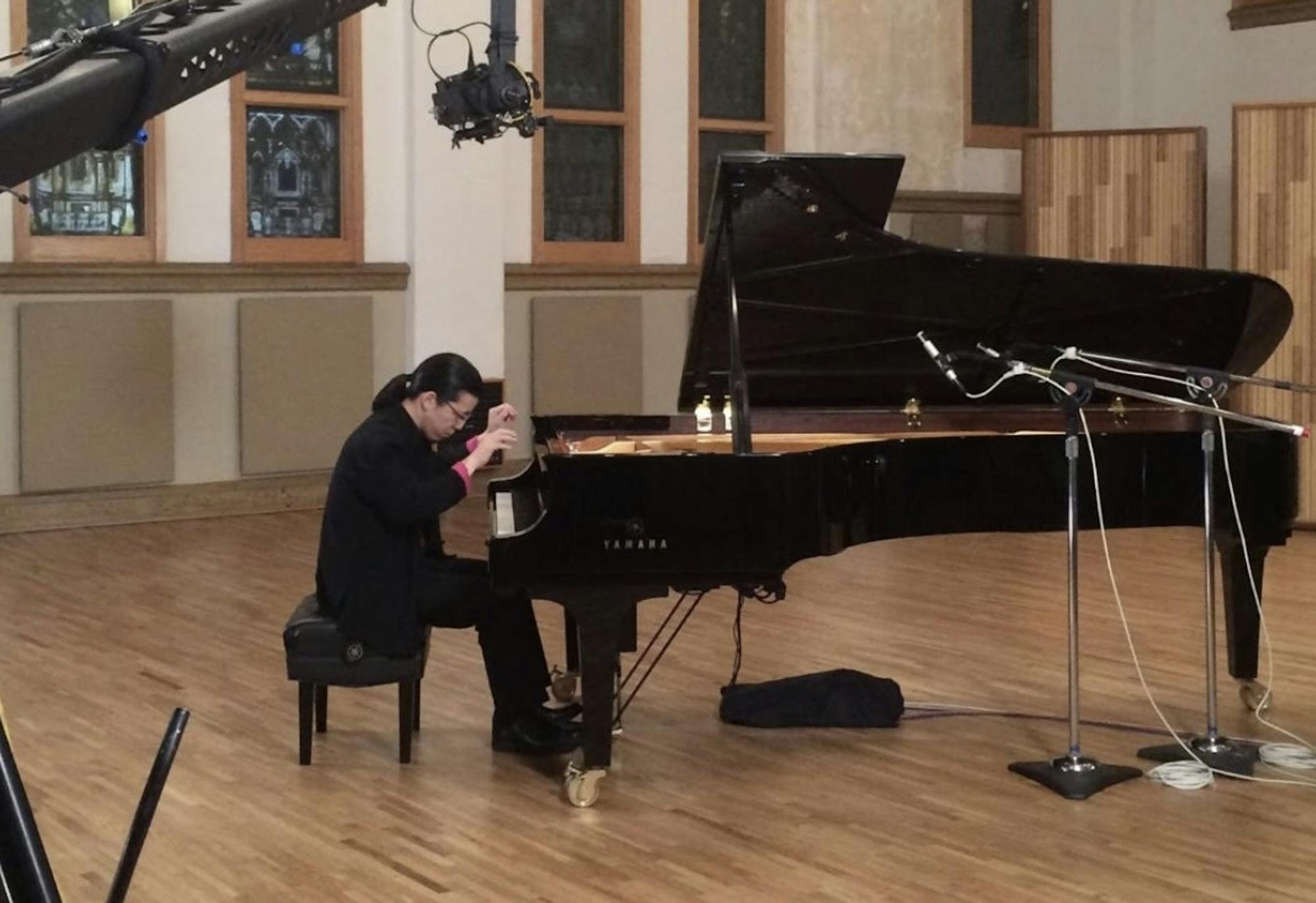On Friday, Jan. 26 at 8 p.m., sweeping layers of sound and light illuminated heavy round arches and stained glass of Dartmouth’s Rollins Chapel, as world-renowned pianist Frederic Chiu performed his Classical Smackdown Time Travelers series.
Performed in eight countries and 28 states, Chiu started playing the series over 10 years ago. The unique structure of the performance engages audiences by having them choose between two composers — the Baroque musician Johann Sebastian Bach and the contemporary classical composer, Philip Glass.
Chiu’s performance was composed of three rounds, each highlighting compositions from Bach and Glass. After each round, the audience was given a few minutes to reflect on their experience and “vote” for their preferred composer on paper ballots distributed at the beginning of the program. At the end, listeners cast an overall vote, separate from the round votes.
“It’s like taste testing food or wine. You taste this, you taste that. Which one do you react to? Which one do you prefer?” Chiu said.
The first round was an introduction with an emphasis on style, rhythm, clarity and structure. The second oscillated from intense lyrical beauty, hollow dissonance and bell-like chords in Glass’s “Metamorphosis” to instances of Bach’s swift, captivating sixteenth notes in his Partitas.
The final round highlighted the deeply spiritual, moving elements to both composers’ works. Chiu played his transcription of Bach’s “Erbarme dich, mein Gott,” from “St. Matthew Passion.” The piece relates the despair resulting from the Apostle Peter’s betrayal of his Messiah, according to program notes. To close, Chiu played Glass’s “Mad Rush,” originally written and performed for the Dalai Lama in 1979.
Although there is almost 300 years time between the two composers, both evoke a “sense of spirituality” and a “hypnotic quality of ecstasy,” according to program notes. Whereas a Glass score often contains only a few musical phrases that are altered and repeated, Bach’s music rarely repeats itself through its complex maze of intertwining layers and voices. Despite their differences, the audience preferences are often an even 50/50 split between the composers, according to Chiu.
“I call it time travelers,” Chiu said. “Both composers are so far apart in time, and yet, they’re being played today. At the same time, they play with our sense of time, they make time seem to shrink or expand. And there’s a very spiritual sense in both of them. So even though they’re so far apart in time, they speak to the same core elements of being humans.”
He compared it to the feeling of watching a time lapse of Grand Central Station during rush hour, or the stop motion picture of a bullet piercing an apple.
“And what is it that makes us feel time and sense time in the music?” Chiu asked.
During his performance, warm fuchsias, deep velvets and muted yellows colored the tall arches of the chapel. The lights shifted with the movements, reflecting the crescendos, the decrescendos, and the inner experiences that enthralled the audience and seemingly warped time.
The nature of the program compelled audience members to listen with intention. Listeners were encouraged to gently press their eyes together and feel the music as it ripples, runs, topples and sways. They scribbled in the margins of their ballots and leaned on the edge of their seats.
“You know, why are they voting between two composers? The composers don't care,” said Chiu. “There's no consequence for voting one way or the other. But at the same time, when you have to mark something down, it makes you listen differently. It makes you a lot more engaged.”
Chiu designed the Classical Smackdown series in part because he wanted audience members to interact with the music.
“Classical music can be like a museum visit,” Chiu said. “Here’s the music. We listen to it, and we leave. I’d rather have it be an interactive experience, which is how I feel it myself. I’m interacting with the music day after day for years. And I think the audience needs just a little bit of prompting to help them be more interactive.”
For Enzo La Hos Calassara ’27, the experience of interacting with both composers was deeply moving. He voted for Glass and particularly enjoyed Glass’s “Metamorphosis: Two” and “Mad Rush.”
“Bach is technically the better composer. Because every time you listen to a Bach piece, you’re interested in the new, it’s just so dense and so polyphonic. But the Glass, at least for me, my experience tonight kind of put me in a trance,” Calassara said. “I was on the edge of a dream the entire time.”
Chiu hopes that the nature of his Classical Smackdown series will continue to generate conversation.
“What I love about the smackdown concerts is at the end, people don’t get out of their seats right away trying to get to the parking lot to get to their cars,” Chiu said. “They sit down and say, ‘Well, how did you vote?’ There’s a lot of discussion that happens afterwards like that. And I like that a lot.”
Cove Geary GR described the performance as a “gentle competition.”
“I felt like the Glass made me feel a lot of things,” Geary said. “I really loved hearing the voices.”
He voted for Glass twice but ultimately cast his overall vote for Bach.
Chiu keeps record of all the results of his Classical Smackdowns, separating votes by age, gender and musical background. For Dartmouth’s performance, Glass won 57% of the total vote.




